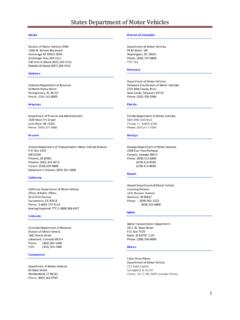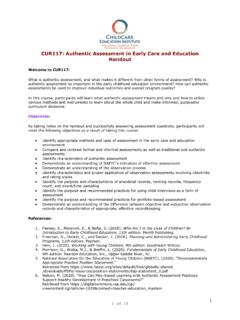Transcription of This Page Left Intentionally Blank
1 This Page Left Intentionally Blank DWI Detection and standardized field sobriety Testing (SFST) Refresher Instructor Guide October 2015 Save lives, prevent injuries, reduce vehicle-related crashes This Page Left Intentionally BlankPreface The standardized field sobriety Testing (SFST) training curriculum collectively prepares police officers and other qualified persons to conduct the SFST s for use in DWI investigations. This training, developed under the auspices and direction of the National Highway Traffic Safety Administration (NHTSA), and the International Association of Chiefs of Police (IACP), has experienced remarkable success since its inception in the early 1980s.
2 As in any educational training program, an instruction manual or guide is considered a living document that is subject to updates and changes based on advances in technology and science. A thorough review is made of information by the IACP Technical Advisory Panel (TAP) of the Highway Safety Committee of the IACP with contributions from many sources in health care science, toxicology, jurisprudence, and law enforcement. Based on this information, any appropriate revisions and modifications in background theory, facts, examination and decision making methods are made to improve the quality of the instruction as well as the standardization of guidelines for the implementation of the SFST curriculum.
3 The reorganized manuals are then prepared and disseminated, both domestically and internationally, to the states. Changes will normally take effect 90 days after approval by the TAP, unless otherwise specified or when so designated. The procedures outlined in this manual describe how the standardized field sobriety Tests (SFSTs) are to be administered under ideal conditions. We recognize that the SFST s will not always be administered under ideal conditions in the field , because such conditions do not always exist. Even when administered under less than ideal conditions, they will generally serve as valid and useful indicators of impairment.
4 Slight variations from the ideal, , the inability to find a perfectly smooth surface at roadside, may have some effect on the evidentiary weight given to the results. However, this does not necessarily make the SFSTs invalid. Revised: standardized field sobriety Testing Refresher 10/2015 Preface Page 1 of 1 This Page Left Intentionally BlankINTRODUCTION The Administrator s Guide provides an introduction and overview of the SFST Refresher Training Program. The SFST Refresher Training Program is an Instructor-led program. THIS SFST REFRESHER TRAINING PROGRAM IS INTENDED FOR THE PURPOSE OF REFRESHER TRAINING ONLY. THIS PROGRAM IS NOT A SUBSTITUTE FOR NHTSA/IACP APPROVED DWI DETECTION AND standardized field sobriety TESTING TRAINING.
5 The SFST Refresher Training Program focuses on enforcement of alcohol impaired driving. Other programs have been designed to improve police officers' skills in detecting and apprehending drug impaired drivers, including a 4-hour module , "Introduction to Drugged Driving", the 16-hour Advanced Roadside Impaired Driving Enforcement (ARIDE), and the Drug Evaluation and Classification (DEC) Program. These are available from the International Association of Chiefs of Police (IACP) and the National Highway Traffic Safety Administration (NHTSA). The SFST Refresher Program is provided in a minimum 4-hour modular format. Modules may be added to meet the training needs identified by each individual state SFST or DEC Program Coordinators.
6 These optional modules are included in this curriculum package. DEC Program Coordinators may approve the use of ARIDE to fulfill an individual state s requirement for SFST Refresher Training. Refer to the ARIDE Administrator s Guide for delivery of program. For more information regarding these or other materials and programs, contact your State Office of Highway Safety, NHTSA Regional Training Coordinator, State DEC Program Coordinator, and/or State SFST Training : DWI Detection and SFST Refresher Introduction 10/2015 Administrator s Guide Page 1 of 9 This Page Left Intentionally BlankTABLE OF CONTENTS Purpose of this Document Overview of the Course Intended Audience Purpose of the Training Course Content Length of the Training Instructor-led Course Materials Instructor's Lesson Plans Guide Visual Aids Participant Manual Testing SFST Proficiency Form Post Course Exam Remedial Exam Appendices A.
7 NHTSA Regional OfficesRevised: DWI Detection and SFST Refresher Introduction 10/2015 Administrator s Guide Page 2 of 9 This Page Left Intentionally BlankPURPOSE OF THIS DOCUMENT The Administrator s Guide is intended to facilitate planning and implementation of the SFST Refresher Training Program. The guide provides a general overview of the sequence of instruction for the SFST Refresher Training Program as well as an outline of the Instructor-led modules. OVERVIEW OF THE COURSE Intended Audience SFST Refresher Training is for law enforcement officers at the federal, state, county and local level who have successfully completed the NHTSA/IACP-approved DWI Detection and standardized field sobriety Testing Training Program.
8 Purpose of the Training The primary purpose the SFST Refresher Training Program is to improve the overall consistency of administration of the SFST test battery by individual police officers. Officers can refresh their skills with: recognizing and interpreting evidence of DWI; administering and interpreting the scientifically validated sobriety tests; and describing DWI evidence clearly and convincingly; and information regarding recent case law and research studies. Course Content The minimum SFST Refresher Training Program has four content modules. Each module has an introduction and several topics. Optional modules may be added as described on page one of this document.
9 The following is a description of the topics and content covered in each session: Session Title Duration 1 Introduction and Overview 30 Minutes 2 Vehicle In Motion and Personal Contact 60 Minutes 3 standardized field sobriety Testing Review 60 Minutes 4 Proficiency and Written Examination 90 Minutes Optional Processing the Arrested Subject and Preparation for Trial 90 Minutes Optional Overcoming Impaired Driving Defenses and Legal Issues 90 Minutes Optional Live Alcohol Workshop 60 Minutes Optional Video Alcohol Workshop 60 Minutes Optional Overview of Drug-Impaired Driving 90 Minutes Revised: DWI Detection and SFST Refresher Administration 10/2015 Administrator s Guide Page 3 of 9 Session 1: Introduction and Overview This session has two Segments: "Welcoming Remarks and Objectives" and "Administrative Details".
10 In this session, participants will receive a brief welcome and introduction. Describe your credentials for providing SFST training and carefully state the goals and objectives of the course. This is a preparation step, focused in the cognitive domain of learning. During this segment have the participants introduce themselves and print their names clearly on name tent cards, so that you will be able to call on them by name. Next, you must attend to some essential "housekeeping duties", , by notifying participants of the schedule that will be followed, pointing out the locations of restrooms, lunch rooms, etc. Session 2: Vehicle in Motion and Personal Contact This session is a review of the first two phases of standardized field sobriety Testing.















